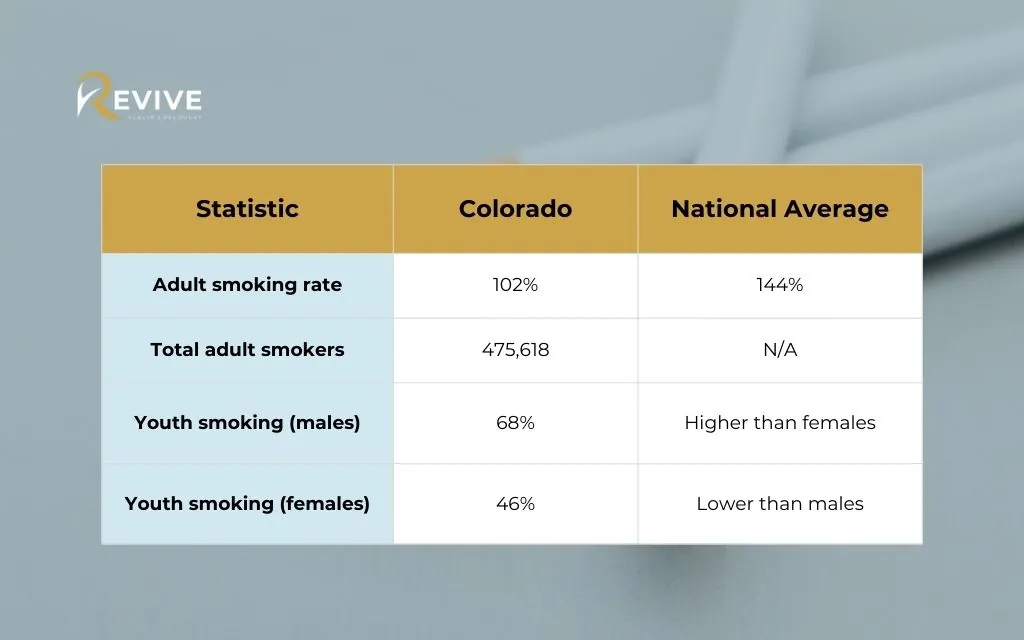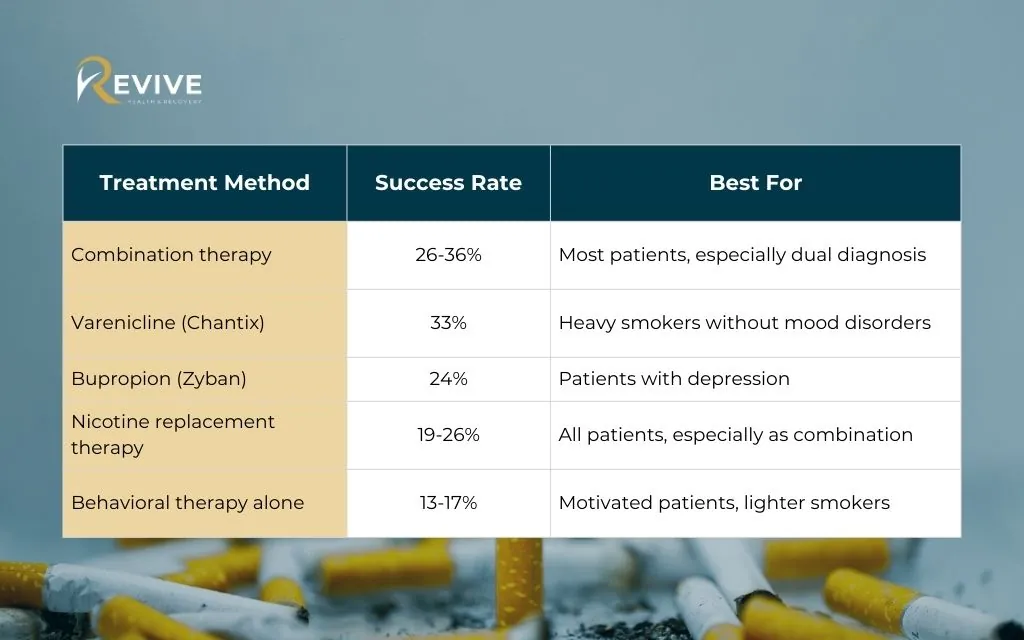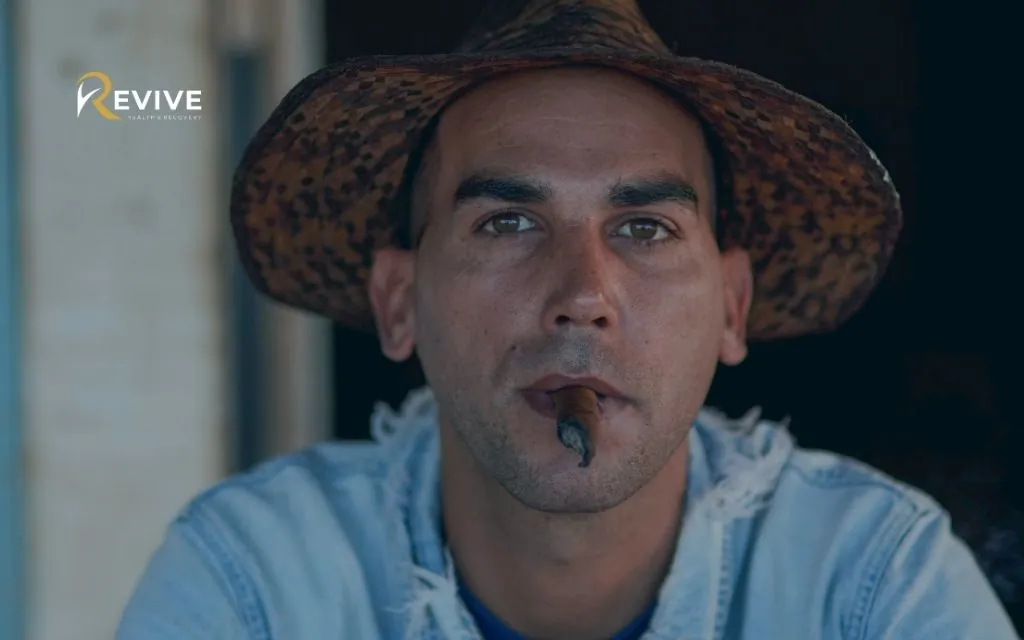Breaking free from tobacco addiction feels overwhelming, especially when mental health challenges complicate your journey. If you’re among Colorado’s 475,618 adult smokers, you’re not alone. More importantly, you have hope. Research shows that combining evidence-based treatments increases success rates to 36%, but choosing the right strategy depends on your unique circumstances, especially if you’re managing anxiety, depression, or other mental health conditions alongside tobacco dependence.
Colorado offers unique resources, from the free Colorado QuitLine to specialized dual diagnosis treatment centers. Whether you’re in Denver, Colorado Springs, or rural mountain communities, and finding which would be the best strategy for overcoming tobacco addiction, It does exist! This comprehensive guide explores the most successful tobacco addiction recovery strategies, with special attention to dual diagnosis considerations that affect one in three smokers.
Ready to explore your options? Contact Revive Health Recovery at (303) 268-4655 for a personalized consultation about which tobacco addiction strategies work best for your situation.
Understanding tobacco addiction and dual diagnosis in Colorado
The science behind tobacco dependence
Nicotine hijacks your brain’s reward system by flooding dopamine pathways with artificial pleasure signals. This creates both physical dependence and psychological attachment that standard willpower cannot overcome.

Colorado Tobacco Statistics:
| Statistic | Colorado | National Average |
| Adult smoking rate | 10.2% | 14.4% |
| Total adult smokers | 475,618 | N/A |
| Youth smoking (males) | 6.8% | Higher than females |
| Youth smoking (females) | 4.6% | Lower than males |
Tobacco addiction is a chronic medical condition, not a personal weakness. The brain changes that occur with regular nicotine use explain why quitting feels so difficult. Understanding this science helps remove shame and opens the door to effective medical treatment.
Struggling to understand your addiction? Our dual diagnosis specialists at Revive Health Recovery can explain how nicotine affects your unique brain chemistry. Call (303) 268-4655 for answers.
Dual diagnosis: when mental health meets tobacco addiction
Dual Diagnosis Statistics:
| Population | Smoking Rate |
| General population | 21% |
| People with mental health conditions | 35% |
| Addiction treatment patients | 65-87% |
Common co-occurring conditions include anxiety, depression, PTSD, and bipolar disorder. Standard smoking cessation programs often fail for dual diagnosis patients because they address tobacco use in isolation. Your brain uses nicotine to self-medicate mental health symptoms, creating a complex cycle that requires specialized treatment.
At Revive Health Recovery, we understand this connection. Our team treats the whole person, not just the addiction.
Evidence-based tobacco addiction treatment methods
Treatment success rates comparison
| Treatment Method | Success Rate | Best For |
| Combination therapy | 26-36% | Most patients, especially dual diagnosis |
| Varenicline (Chantix) | 33% | Heavy smokers without mood disorders |
| Bupropion (Zyban) | 24% | Patients with depression |
| Nicotine replacement therapy | 19-26% | All patients, especially as combination |
| Behavioral therapy alone | 13-17% | Motivated patients, lighter smokers |

Nicotine replacement therapy options
NRT Options and Coverage:
| Type | How It Works | Colorado Coverage |
| Patches | Steady nicotine release | Most insurance plans |
| Gum | Quick craving relief | Colorado QuitLine free program |
| Lozenges | Discrete craving control | Medicaid covered |
| Nasal spray | Rapid absorption | Prescription required |
| Inhalers | Hand-to-mouth habit replacement | Prescription required |
Combination NRT works particularly well for heavy smokers. Using a patch for steady nicotine levels plus gum or lozenges for craving control can increase effectiveness.
Wondering which NRT option suits you best? Our medication management specialists can create a personalized NRT plan. Contact Revive Health Recovery at contact@revivehealthrecovery.com for guidance.
FDA-approved cessation medications
Medication Comparison:
| Medication | Success Rate | Benefits | Considerations |
| Varenicline (Chantix) | 33% | Highest success rate, blocks nicotine receptors | Mood monitoring required |
| Bupropion (Zyban) | 24% | Treats depression simultaneously | Drug interaction screening needed |
Varenicline (Chantix) Blocks nicotine receptors while providing mild stimulation, reducing both cravings and withdrawal symptoms. For dual diagnosis patients, careful monitoring is essential due to potential mood changes.
Bupropion (Zyban) Offers unique benefits for dual diagnosis tobacco recovery methods because it also treats depression. This antidepressant property makes it particularly valuable for patients with mood disorders.
Behavioral therapies and counseling
Therapy Options:
| Therapy Type | Format | Effectiveness | Best For |
| Cognitive Behavioral Therapy | Individual/Group | High | Trigger management |
| Motivational Interviewing | Individual | Moderate | Ambivalent quitters |
| Group therapy | Group | Moderate | Peer support needs |
| Family therapy | Family | High | Relationship healing |
The gold standard: combination treatment approaches
Integrated dual diagnosis treatment
The best tobacco recovery methods combine medication, counseling, and mental health treatment simultaneously. This integrated approach addresses the complex relationship between nicotine and mental health, leading to better long-term outcomes.
Treatment Components:
| Component | Purpose | Duration |
| Medical assessment | Identify interactions, plan medications | Initial visit |
| Behavioral therapy | Develop coping skills, identify triggers | 12-24 weeks |
| Mental health treatment | Address co-occurring conditions | Ongoing |
| Medication management | Monitor effectiveness, adjust doses | Throughout treatment |
| Family support | Strengthen relationships, build support | As needed |
Need coordinated care for tobacco and mental health? Revive Health Recovery specializes in integrated dual diagnosis treatment. Call (303) 268-4655 to discuss your comprehensive treatment plan.
Colorado-specific resources and support systems
Colorado resources directory
State and Local Resources:
| Resource | Service | Contact | Coverage |
| Colorado QuitLine | Free coaching, medications | 1-800-QUIT-NOW | All Colorado residents |
| Denver Health Centers | Comprehensive programs | Multiple locations | Metro Denver |
| UCHealth | Specialized tobacco treatment | Various locations | Statewide |
| University of Colorado | Research-based programs | Boulder/Denver | Clinical trials |
| Revive Health Recovery | Dual diagnosis treatment | (303) 268-4655 | Outpatient services |
Insurance coverage breakdown
Coverage by Plan Type:
| Insurance Type | Medications Covered | Counseling Covered | Notes |
| Colorado Medicaid | Yes, all FDA-approved | Yes, individual and group | No copay |
| Private insurance | Required by federal law | Varies by plan | Check benefits |
| Uninsured | State programs available | Sliding scale options | Financial assistance |
Looking for local treatment coordination? Our team works with Colorado’s major healthcare networks. Contact us at (303) 268-4655 to discuss your options.
Overcoming common challenges in tobacco recovery
Withdrawal symptom timeline
What to Expect:
| Timeframe | Physical Symptoms | Emotional Symptoms | Management |
| Hours 1-24 | Cravings begin, restlessness | Anxiety, irritability | Deep breathing, distraction |
| Days 1-3 | Peak withdrawal, headaches | Mood swings, depression | Medication, support calls |
| Days 4-14 | Decreasing physical symptoms | Concentration issues | Exercise, routine |
| Weeks 3-4 | Occasional cravings | Emotional ups and downs | Therapy, support groups |
| Month 2+ | Rare physical symptoms | Psychological triggers | Long-term coping skills |
Colorado-specific considerations:
High altitude affects how your body processes nicotine, potentially requiring dosage adjustments for medications. Seasonal affective patterns common in mountain communities may influence quit timing and strategies.
Struggling with withdrawal?
Our 24/7 support line helps manage difficult moments. Call Revive Health Recovery at (303) 268-4655 whenever you need guidance.

Preventing relapse strategies
Common Triggers and Solutions:
| Trigger | Risk Level | Prevention Strategy |
| Stress | High | Meditation, exercise |
| Alcohol | Very High | Avoid/limit during early recovery |
| Social situations | Moderate | Plan responses, support person |
| Emotional states | High | Therapy, medication management |
| Boredom | Moderate | New hobbies, Colorado outdoor activities |
Success stories and treatment outcomes
Real recovery stories from Colorado
- Sarah’s Journey (Denver) Struggled with anxiety and tobacco for fifteen years. Through integrated dual diagnosis treatment at Revive Health Recovery, she addressed both conditions simultaneously. Today, she’s been tobacco-free for two years and manages anxiety with healthy coping strategies.
- Michael’s Family Healing Story His tobacco addiction and depression affected relationships with his wife and children. Comprehensive treatment helped him quit smoking while strengthening family bonds through improved mental health.
- Want to share your success story? We celebrate every victory at Revive Health Recovery. Contact us at contact@revivehealthrecovery.com to inspire others.
Colorado treatment outcomes
5-Year Follow-up Results:
| Treatment Type | 1-Year Success | 5-Year Success | Cost-Effectiveness |
| Integrated dual diagnosis | 45% | 38% | $3 saved per $1 spent |
| Medication only | 25% | 18% | $2 saved per $1 spent |
| Counseling only | 20% | 15% | $1.50 saved per $1 spent |
| No treatment | 5% | 3% | Increasing healthcare costs |
FAQs about which would be the best strategy for overcoming tobacco addiction
What is the most effective treatment for tobacco addiction with co-occurring mental health conditions?
The most effective approach combines FDA-approved medications with behavioral counseling while simultaneously treating mental health conditions. At Revive Health Recovery, we specialize in this integrated dual diagnosis model, which shows success rates of 26-36% compared to 13-19% for single-treatment approaches.
How long does tobacco addiction treatment typically take, and what should I expect?
Most people benefit from 3-6 months of active treatment, followed by ongoing support. Initial withdrawal symptoms peak within 72 hours, while psychological aspects require longer attention. Our team at Revive Health Recovery provides personalized timelines based on your specific situation and mental health needs.
Will my insurance cover tobacco addiction treatment in Colorado?
Colorado Medicaid and most private insurance plans cover tobacco cessation treatment, including medications and counseling. Coverage varies by plan, so we verify benefits and help navigate insurance requirements. Contact Revive Health Recovery at (303) 268-4655 for insurance verification assistance.
Can I receive tobacco addiction treatment if I’m not ready to quit immediately?
Absolutely. Motivational interviewing and harm reduction approaches help you explore your relationship with tobacco without pressure to quit immediately. Our team supports you at whatever stage of readiness you’re experiencing.
What makes dual diagnosis tobacco treatment different from standard smoking cessation programs?
Dual diagnosis treatment addresses the complex relationship between nicotine and mental health symptoms. Standard programs often fail because they don’t recognize how people use tobacco to self-medicate anxiety, depression, or other conditions. Revive Health Recovery’s integrated approach treats both conditions simultaneously for better outcomes.
Start your recovery journey at Revive Health Recovery
Transform your relationship with tobacco through compassionate, evidence-based dual diagnosis treatment. At Revive Health Recovery, we understand that tobacco addiction often coexists with mental health challenges, requiring specialized care that addresses both conditions simultaneously.
Our Colorado-focused approach includes:
| Service | Description |
| Comprehensive assessment | Dual diagnosis evaluation and treatment planning |
| Medication management | Evidence-based prescribing and monitoring |
| Behavioral therapy | Individual and group sessions |
| Mental health counseling | Integrated addiction and mental health treatment |
| Relapse prevention | Ongoing support and planning |
| Care coordination | Connection with Colorado healthcare networks |
Why choose Revive Health Recovery:
| Advantage | Benefit |
| Specialized expertise | Dual diagnosis treatment focus |
| Personalized care | Treatment plans tailored to your needs |
| Convenient location | 1427 S Federal Blvd, Denver |
| Flexible scheduling | Outpatient programs that fit your lifestyle |
| Insurance-friendly | Multiple payment options and assistance |
| 24/7 support | Crisis availability when you need help |
Contact revive health recovery
- Address: 1427 S Federal Blvd, Denver, CO 80219
- Email: contact@revivehealthrecovery.com
- Phone: (303) 268-4655 (Available 24/7)
Next Steps:
- Call for a confidential consultation
- Discuss your personalized treatment plan
- Begin your journey to tobacco freedom
- Access ongoing support and resources
Take the first step toward lasting recovery. Our compassionate team is ready to help you develop a personalized treatment plan that addresses both your tobacco addiction and any co-occurring mental health conditions. Call today for a confidential consultation and discover how our outpatient dual diagnosis program can transform your life.
Your journey to freedom starts with a single phone call. We’re here to help you find the best strategy for overcoming tobacco addiction that works for your unique situation.
Conclusion
Overcoming tobacco addiction is challenging, but with the right support and evidence-based treatment, lasting recovery is achievable. Colorado residents have access to exceptional resources, from state-funded quitlines to Denver specialized dual diagnosis treatment centers like Revive Health Recovery.
Don’t wait another day to reclaim your health and freedom. Which would be the best strategy for overcoming tobacco addiction in your unique situation? Our team can help you discover the answer.



